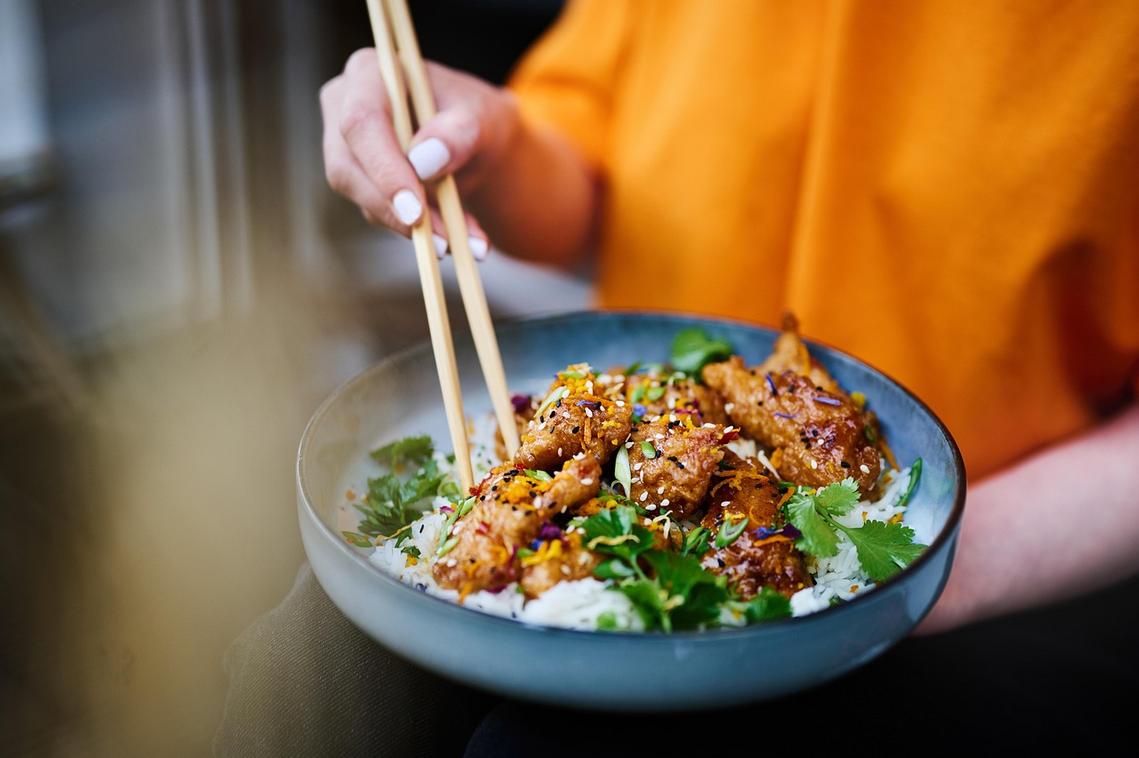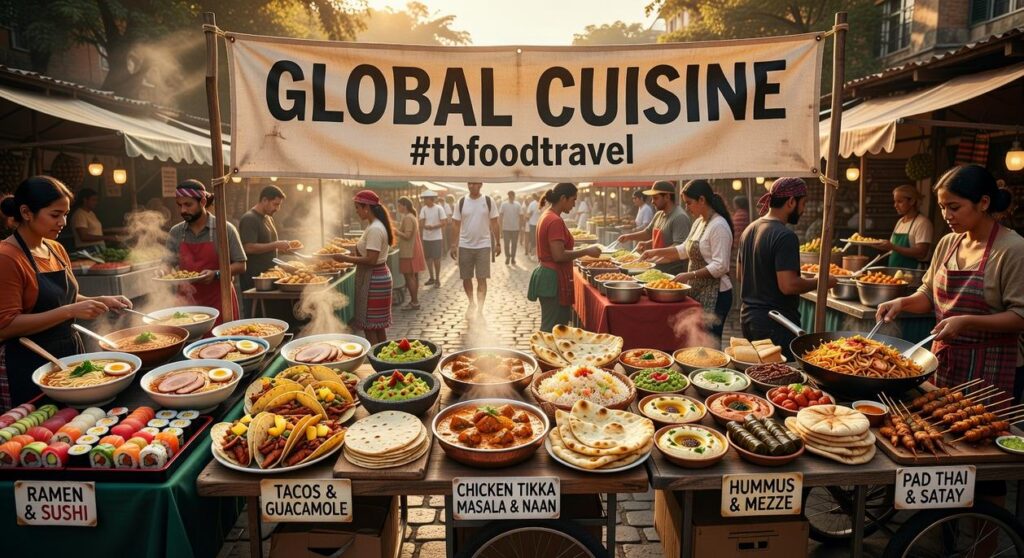I’ve eaten my way through 47 countries and learned something important: the best food never makes it onto tourist maps.
You’re probably tired of ending up at the same overpriced restaurants that cater to visitors. The ones with laminated menus in five languages and food that tastes like it could be anywhere.
Here’s what I know: real global cuisine tbfoodtravel happens in places you won’t find on Instagram. It happens in home kitchens, neighborhood markets, and tiny spots where locals actually eat.
I spent years figuring out how to find these places. Not by luck or stumbling around. By using a simple framework that works in any country.
This guide shows you how to discover food that actually matters. The kind that connects you to a place and its people.
You’ll learn how to spot the real deal, avoid the tourist traps, and eat like you belong there. Not just what to eat, but how to find it and why it matters.
No restaurant lists that’ll be outdated next month. Just a system you can use anywhere you go.
Why Food is the Ultimate Travel Guide
You want to know when I really understood a place?
It wasn’t standing in front of the Eiffel Tower or checking off another UNESCO site.
It was sitting in a cramped noodle shop in Chiang Mai at 6 AM. The owner didn’t speak English and I didn’t speak Thai. But she watched me struggle with my chopsticks and laughed. Then she showed me the right way to hold them while her broth simmered behind her.
That’s when it clicked.
Food tells you everything a guidebook can’t.
When you eat what locals eat, you’re tasting their history. Their climate. The crops their grandparents grew. You’re learning what they value enough to pass down through generations.
Sure, you could spend your trip taking photos of monuments. Most people do. They hit the famous spots, check the boxes, and go home with a camera roll full of the same shots everyone else has.
But here’s what they miss.
The woman selling mangoes at the market who’ll tell you about her daughter studying abroad. The cooking class where you learn that global cuisine tbfoodtravel isn’t just about recipes but about why certain spices matter in certain places. The hole-in-the-wall restaurant where regulars gather every Tuesday.
These moments don’t make it to Instagram highlight reels.
But they’re what you’ll remember five years later.
Next time you plan a trip, flip your approach. Don’t ask what landmarks you should see. Ask what you should eat and where locals eat it.
Let your taste buds lead. The rest will follow.
A Culinary Tour of Asia: A Symphony of Flavors
The Street Food Experience (Thailand)
I’ll never forget my first night at Yaowarat Road in Bangkok.
The air hits you first. Charcoal smoke mixed with fish sauce and palm sugar. Then the sound. Woks clanging against gas burners while vendors shout orders in rapid-fire Thai.
It’s organized chaos at its finest.
Here’s what I learned about picking the right stall. Forget the fancy setups with English menus. Look for the carts where locals are waiting three deep. That’s your signal.
My go-to move? Watch what the person in front of you orders. If five people in a row get the same dish, you order it too.
Must-try dishes that changed how I think about street food:
• Pad Krapow Moo Saap (the version with a crispy fried egg on top)
• Mango Sticky Rice from any cart near Wat Pho after 6 PM
• Grilled pork skewers (moo ping) with sticky rice
The best vendors work the same corner for decades. Their hands move without thinking while they talk to regulars and flip ingredients at the same time.
The Art of Simplicity (Japan)
Most people think Japanese food starts and ends with sushi.
They’re missing the whole point.
I spent a morning in Kagawa Prefecture learning to make udon from a woman who’d been doing it for forty years. She used three ingredients. Flour, water, salt. That’s it.
But the technique? That took her decades to perfect.
She showed me how to knead the dough with my feet (yes, really) and how the humidity that day changed everything about the water ratio. In Kyoto, I watched a wagashi master shape traditional sweets that looked too perfect to eat.
What struck me most was the obsession with seasons. Spring wagashi use sakura. Summer versions incorporate yuzu. The ingredients tell you what month it is without asking.
This is what global cuisine tbfoodtravel is really about. Not just eating food but understanding why it exists the way it does.
The Market Immersion (Vietnam)
Ben Thanh Market in Ho Chi Minh City opens at 6 AM.
Get there by 7 if you want to see it at full speed. The vendors are setting up fresh herbs in water buckets while motorbikes somehow weave through the narrow aisles delivering supplies.
I spent three mornings there learning to spot quality ingredients. Fresh lemongrass should smell sharp and citrusy when you scratch the stalk. Fish sauce (nuoc mam) comes in grades. The good stuff is clear amber and lists anchovies as the first ingredient.
The real fun starts when you build your own banh mi. Grab a fresh baguette from the baker near the north entrance (still warm if you time it right). Then hit the stalls for pate, pickled daikon, cilantro, and whatever protein looks good that day.
One vendor taught me her trick. She adds a smear of mayonnaise mixed with chili paste before anything else goes in. Game changer.
The chaos makes sense once you spend time there. Every vendor has their specialty and everyone knows it.
Savoring Europe: Tradition on a Plate

The Farm-to-Table Journey (Italy)
I still remember my first morning at an agriturismo in Tuscany.
The rooster woke me up at dawn (not exactly the gentle Italian wake-up call I’d imagined). But what happened next made it worth it.
We walked straight from our room to the chicken coop. Grabbed eggs that were still warm. Then headed to the kitchen where Maria, the owner’s wife, was already rolling out dough.
That’s when I learned something important. Real Italian pasta doesn’t need much. Just flour, those fresh eggs, and a pinch of salt.
We pressed our own olive oil that afternoon. The kind that’s so green and peppery it makes you cough a little. By dinner, we were eating pasta dressed with that same oil and tomatoes picked an hour before.
This is what agriturismo means. You’re not just eating food from the farm. You’re part of the process.
Pro tip: Book your agriturismo stay during harvest season. You’ll get to help with olive picking or grape harvesting, and the meals are even better.
The Tapas Crawl (Spain)
Here’s what most tourists get wrong about tapas.
They sit down at one restaurant and order ten dishes. Then they wonder why locals are giving them funny looks.
A proper tapeo means moving. One bar, one or two tapas, one drink. Then you move to the next spot.
I learned this the hard way in Seville. My first night, I planted myself at a corner table and ordered half the menu. The waiter was polite but I could tell something was off.
The next night, I followed a group of locals. We hit five bars in two hours. Each place had their specialty. Jamón at the first stop. Gambas al ajillo at the second. Croquetas at the third.
Now when I do a tapas crawl in San Sebastián, I know the rhythm. Stand at the bar. Order your pintxo. Pair it with a small glass of txakoli or vermouth. Chat for fifteen minutes. Move on.
The food is great but that’s not really the point. It’s about the ritual. The social part.
The Festival Feast (Global)
Food festivals show you what a region is actually proud of.
Last summer I went to a cheese festival in the Loire Valley. Not the big touristy one. A small village event where local producers set up tables in the town square.
I watched a cheesemaker explain why his Crottin de Chavignol tastes different from his neighbor’s. Same goats, same grass, but his aging cave has different humidity. That half-degree difference changes everything.
These festivals give you access you can’t get anywhere else. You taste things that never make it to restaurants. You meet the people who make the food, not just serve it.
At a seafood festival in Portugal, I tried percebes (goose barnacles) for the first time. The fisherman who caught them showed me the scars on his hands from climbing rocks in rough surf. Suddenly that weird-looking shellfish meant something different.
When you’re planning your trip, check local event calendars. These festivals happen year-round and they’re where you’ll find the real global recipes tbfoodtravel comes from.
Just show up hungry and ready to talk to people. That’s all you need.
Exploring the Americas: A Fusion of Heritage and Innovation
You’ve got two paths here.
You can hit the tourist restaurants with their sanitized versions of local food. Or you can go where the real cooking happens.
I’m talking about the places where grandmothers still grind spices by hand and chefs are doing something wild with ingredients that predate the Spanish conquest.
Lima vs Oaxaca. Both will change how you think about food. But they do it differently.
In Lima, you’ll find chefs treating quinoa and aji amarillo like they’re building blocks for something NEW. The ceviche scene alone is worth the flight. (And yes, you should absolutely book a ceviche-making class while you’re there.)
This is where ancient meets experimental.
Now Oaxaca? That’s a different story.
Walk through a mercado there and you’re stepping into centuries of traditional cuisine tbfoodtravel that hasn’t budged much. The mole alone comes in seven major varieties. Each one takes DAYS to make properly.
You’ll see piles of chiles you can’t name. Vendors selling chapulines for the brave. (They’re crunchier than you’d think.)
This is preservation over innovation. And it’s beautiful in its own right.
Here’s my take. Lima shows you what’s possible when you push boundaries. Oaxaca shows you why those boundaries existed in the first place.
Pro tip: Your hotel staff knows more than Yelp ever will. Ask your taxi driver where THEY eat. Hit up shopkeepers for recommendations.
That’s how you find the spots that don’t show up in guidebooks.
Your Culinary Adventure Awaits
You came here looking for a way to travel that goes deeper than tourist traps and hotel restaurants.
I get it. Generic meals and missed opportunities leave you feeling like you barely scratched the surface of a place.
This guide gives you a clear roadmap for planning travels that are rich in authentic culinary experiences. From Asia to the Americas, you now know how to find the real flavors.
Markets tell you what locals actually eat. Cooking classes put you in the kitchen with people who’ve been making these dishes their whole lives. Local recommendations take you where guidebooks don’t.
These aren’t just meals. They’re your direct connection to culture and the memories that stick with you long after you’re home.
Here’s what you should do next: Start planning your next trip not by the sights you’ll see, but by the flavors you’ll discover.
Pick a cuisine that excites you. Maybe it’s the street food of Bangkok or the coastal dishes of Peru.
Let your appetite lead the way. global cuisine tbfoodtravel helps you turn that hunger into experiences you’ll never forget.
No more settling for what’s convenient. You’re ready to step off the beaten path and eat like you mean it. Homepage.

